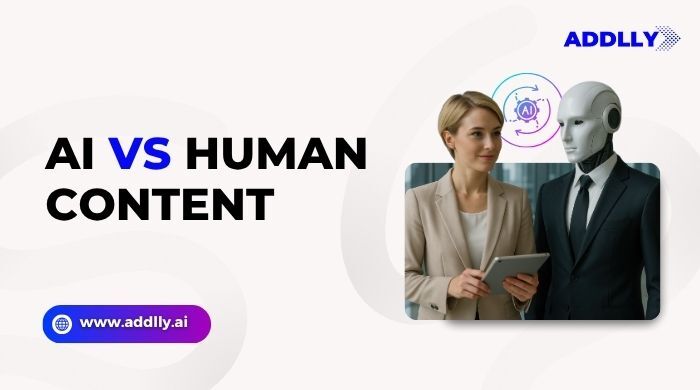In today’s digital age, the debate around AI vs human content is hotter than ever. Whether you’re publishing blog posts, creating product descriptions, or planning your content strategy, knowing which delivers better results can change your approach.
With artificial intelligence tools now able to generate content at scale, many brands face a new choice: trust AI generated content or rely on the personal touch of human writers.
This guide breaks it down, so you can make informed decisions for your business.

What Is AI-Generated Content?

AI-generated content is text, images, or media created by machines using artificial intelligence. With AI tools and machine learning, platforms can now generate content fast for many content types, including blog posts and product descriptions. AI generated content uses data from millions of online content sources, which helps in writing clear, keyword-optimized material.
While AI generated text can have a consistent tone and meet basic SEO needs, it often lacks the human touch, emotional depth, and cultural relevance human writers provide. Still, businesses use AI to create content quickly and scale their content creation process to meet growing digital demands.
How AI Content Tools Work in 2025?
AI content writing tools in 2025 use advanced machine learning and artificial intelligence to generate content at impressive speeds. These tools process vast amounts of data from online content, news, and previous blog posts. They understand language patterns and can create text that fits your brand’s voice.
AI tools assist in generating ideas, writing product descriptions, and even overcoming writer’s block.
With the ability to generate content in large volumes and adapt to industry trends, AI writing platforms now help users create content that aligns with current SEO best practices, making them essential for the modern content.
Popular AI Content Writing Tools for SEO
Many AI content writing tools help businesses generate content quickly and efficiently. Among these, Addlly AI stands out as the best option in 2025. Addlly AI lets users create custom AI agents for a wide range of content creation needs.
With Addlly AI, you can power up your SEO with our AI SEO Agent, social media, and content strategy using our AI agents. Its Generative Engine Optimization AI Agent allow you to create content that not only ranks well on search engines but also drives engagement across different channels.
There are many more AI content writing tools which offers good results, but Addlly AI gives you more control and customization, along with best output.
Pros and Cons of Using AI Content
Pros of AI Content
- Speed and Efficiency: AI tools can generate content in large volumes, saving time and helping businesses meet tight deadlines for publishing blog posts or updating product descriptions.
- Cost-Effectiveness: AI generated text lowers costs by reducing the need for a large team of human writers. Companies can produce more online content for less money, improving their overall content creation process.
- Consistency in Brand’s Voice: AI writing tools maintain a consistent tone and style across all content types, helping brands align content with their strategic objectives and build a clear brand identity.
Cons of AI Content
- Lacks Human Creativity: AI struggles with generating ideas that feel truly original. AI generated content can sometimes feel generic and miss the personal touch human writers bring.
- Limited Emotional Resonance: AI content may not connect with the audience on an emotional level. The absence of human touch often leads to less engaging content and lower reader loyalty.
- Potential for Inaccuracy: AI models depend on existing data, which means they can make factual mistakes or overlook current trends, requiring human expertise to ensure accuracy and real value.
What Is Human-Generated Content?

Human-generated content is written and created by people who bring their own knowledge, experiences, and creativity to the process. Human writers use research, intuition, and personal insight to produce blog posts, product descriptions, and many other content types that connect with the audience.
This approach to content creation allows for more cultural relevance, emotional depth, and strategic insight. While it takes more time and higher costs to create content this way, human writing adds value and trust that search crawlers and readers both appreciate.
The human element is essential for building a brand’s voice and strong brand identity.
Unique Strengths of Human Writers
Human writers bring more than just words to the table. They add human creativity, deep understanding, and personal touch to every piece of content. With experience in different industries, human writers can create content that truly connects with the audience and drives engagement.
Their ability to explain complex ideas simply, tell stories, and include emotional resonance makes human generated content more relatable. Human writing ensures brand uniqueness, identity and personal relevance are never lost.
This human expertise makes it possible to align content with business goals while building trust and loyalty with readers.
Pros and Cons of Using Human Content
Pros of Human Content
- Authenticity and Creativity: Human writers bring fresh perspectives, creativity, and original ideas to blog posts, ensuring each piece of content stands out and feels unique to the audience.
- Emotional Connection: Human writing often carries emotional resonance, which helps build trust and loyalty with readers. This personal touch makes content more memorable and engaging.
- Strategic Insight: Human expertise allows writers to align content with brand goals and business identity, crafting persuasive arguments that appeal directly to your target audience.
Cons of Human Content
- Higher Costs: Using experienced writers brings higher costs, as their skill and expertise require more investment compared to AI generated content or automated tools.
- Slower Production: The writing process for human generated content takes longer. Research, editing, and creating original material requires more time to ensure quality and accuracy.
- Inconsistency Risk: Different human writers may interpret brand’s voice or tone in various ways, leading to some inconsistencies in large volumes of content, especially across diverse content types.
AI vs Human Content: Key Differences Explained
Quality, Creativity, and Depth
Human generated content stands out for its creativity and emotional depth. Human writers draw from personal experience and intuition to create content that feels authentic and builds trust. In contrast, AI generated content follows data and patterns.
It produces large volumes of text quickly but can feel generic and lacks the deeper understanding needed to connect with readers on an emotional level.
Speed, Scalability, and Cost
AI generated content excels in speed and scalability. AI tools can generate content in seconds and produce massive amounts of blog posts or product descriptions with little effort. This leads to lower costs and faster output for brands.
Human writing, while slower, brings a personal touch but can raise costs due to the time and effort required by human writers to ensure quality and consistency across all content types.
Reliability, Accuracy, and E-E-A-T
AI tools rely on vast data sets to generate content, but they can still make factual errors or lack the expertise required for certain topics. Human writers use real-world knowledge and personal experience to ensure accuracy and reliability.
When it comes to Google’s E-E-A-T (Experience, Expertise, Authoritativeness, Trustworthiness), human generated content usually performs better because it provides expert insight, authoritative voice, and builds trust with both the audience and search engines.
Personalization and Ethical Considerations
Human writers excel at personalization by understanding their audience’s needs and preferences. They can add relevance and ethical judgment to content, helping brands connect in a meaningful way.
AI generated content, while efficient, often struggles to personalize text or handle sensitive topics ethically. This can lead to issues with trust and relevance. For brands looking to build strong relationships, the human touch remains vital.
SEO Performance: Which Ranks Better in 2025?
Google’s Current Guidelines on AI Content (E-E-A-T, Helpful Content, etc.)
Google’s guidelines stress the importance of Experience, Expertise, Authoritativeness, and Trustworthiness (E-E-A-T). While AI generated content is now allowed, Google rewards content that is accurate, unique, and provides real value.
AI writing must still follow these rules. Human writers have an advantage because they can share personal experience and expert insights, which makes their content more helpful and credible to both users and search crawlers.
Real-World Engagement, Click-Through Rate, and Dwell Time
AI generated content can boost output and help fill websites with new articles, but it sometimes struggles to hold reader attention. Human written content, with its personal touch and creativity, tends to keep readers engaged for longer.
Studies show that blog posts crafted by humans often have higher click-through rates and dwell time, which are important signals to search engines that your content is valuable and relevant.
How Businesses Mix AI and Human Writers
Businesses use a hybrid approach by combining the speed of AI generated content with the insight of human writers. AI tools help generate content ideas, create first drafts, and handle repetitive writing tasks. Humans then review, edit, and personalize the text to match the brand’s voice and audience needs.
This mix allows brands to scale content creation while ensuring each piece has creativity, emotional depth, and strong brand identity. The result is more effective blog posts and better SEO performance.
How Addlly AI Can Help?
Addlly AI is leading the way for businesses looking to get the most from AI generated content and human expertise. This tool lets you create custom AI agents that can power your SEO, content creation, and social media campaigns.
With Addlly AI, you can generate content in large volumes, tailor it to your brand’s voice, and optimize for Generative Engine Optimization (GEO). It helps with generating ideas, drafting blog posts, and managing different content types. Addlly AI also ensures you maintain quality and consistency while saving time and costs.
When to Use AI, Human, or Both?
The best results in content creation often come from knowing when to use AI, human written content, or a mix of both. Use AI generated content for tasks like generating large volumes of product descriptions, handling routine blog posts, or quickly updating online content.
Turn to human writing when you need emotional resonance, personal stories, or deeper understanding, especially for your brand identity or sensitive topics. Many brands find that integrating AI and human expertise lets them create content efficiently while keeping it engaging and trustworthy for their audience.
Final Words
Choosing between AI content and human writing depends on your goals, audience, and brand identity. AI tools help businesses scale content creation, save costs, and speed up the process. However, the personal touch, strategic insight, and emotional connection from human content remain essential for trust and long-term engagement.
The most successful brands in 2025 will combine both, creating blog posts and content types that drive engagement and meet SEO needs. The future of content creation is about balance, letting AI and human expertise work together.
Read more in our guide: Will AI Replace Human Writers
FAQs – AI vs Human Content
Can AI Content Rank on Google in 2025?
Yes, AI content can rank on Google in 2025 if it is helpful, well-written, and meets Google’s guidelines. Focus on quality, accuracy, and user intent. It is important to add value and keep the content clear and engaging so search engines see it as useful for readers.
Is AI Content Better Than Human Content?
AI content is great for speed and handling big projects, but it often lacks the creativity and personal touch that human editors and writers provide. The best choice depends on your needs. For original ideas and building trust, human content still has the edge, but using both can work well together.
Is Human-Written Content Always Better for SEO?
Human-written content often does better with readers and builds more trust. It is better for sharing real stories and expert advice. But for SEO, what matters most is the quality, value, and relevance of your content. AI can help, but people still connect best with real human writing.
How to Balance AI and Human Inputs?
Balance AI and human inputs by using AI tools for fast drafts and routine writing, then having human review, edit, and add a personal touch. This approach gives you the best of both worlds: efficiency from AI and creativity, emotional depth, and trust from human expertise.
Will AI Replace Human Writers?
AI will not fully replace human written content. While AI can handle basic content and big volumes, human editors bring unique ideas, real experiences, and emotional connections that AI cannot copy. For brands that want to stand out and build strong relationships, the human touch will always matter.
Can Google Detect AI Content?
Google can often spot AI content using advanced AI text detection tools, but it does not automatically punish it. What matters most is if the content helps readers and meets quality standards. Both AI and human content can rank well if they provide real value and are well made.


